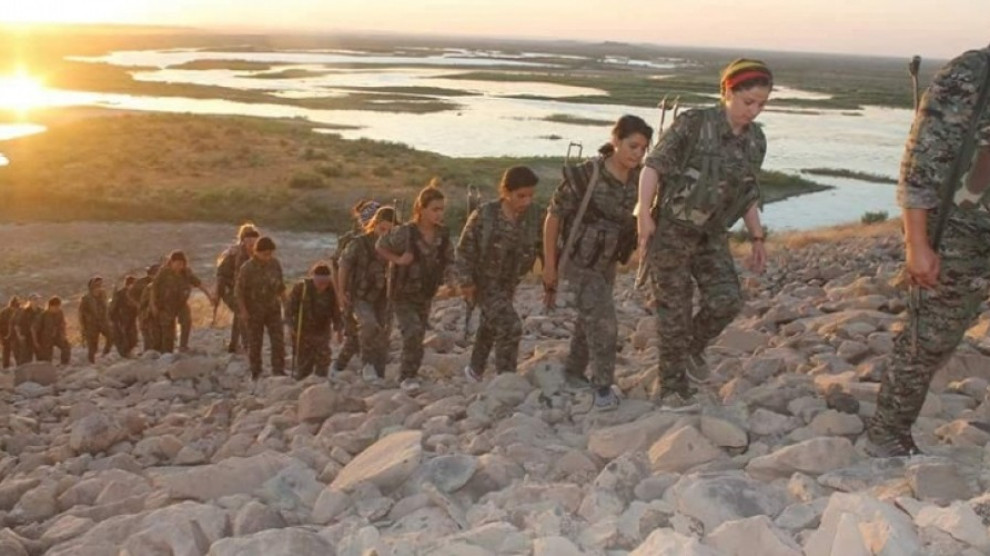Rojava Revolution became an inspiration for women worldwide
Xalide Engizek said the Rojava Revolution led by women has become an inspiration for the women of the world as they felt without hope or morale.
Xalide Engizek said the Rojava Revolution led by women has become an inspiration for the women of the world as they felt without hope or morale.

The Rojava Revolution is 8 years old now. Xalide Engizek, one of the women who led the revolution as it took root in society, spoke to ANF about the foundation and conjuncture the Rojava Revolution emerged in and developed.
Engizek said the nation state has become the source of a great many issues in the Middle East in particular, as a structure that has lived past its time: “Chaotic processes bring about moments of freedom, and the creation of freedom and new structures manifest in the moment. Revolutionary developments emerge thusly. In revolutionary processes there is transformation and re-creation.”
BASED ON THE THIRD LINE
Engizek said the Syrian people rose up on March 25, 2011 in Dera and spread throughout Syria like so many dominoes: “The voice rising from Rojava, the proposed project and the stance that was displayed affected the revolutionary process in Syria. In the Middle East and the world, two lines were fighting each other. Neither of them had a lasting solution project for the issues. The democratic society project based itself on the third line in Rojava and the Middle East and foresaw a politics accordingly. Without touching the borders, the Rojava region would be liberated within Syria with the common homeland principle. A life based on the fraternity of peoples based on the democratic nation and a constitution based on women’s emancipation would be created. The people would organize and build their own social system, all the while not attacking anybody and developing self defense based on legitimacy.”
WOMEN TO LEAD
Engizek said one of the fundamental principles of the third line is to organize the people, and another is to reconcile social conflict and clashes on a democratic foundation and act in agreement with other movements and parties in the Kurdish issue: “The project foresaw the determining of common policies to facilitate transformation and constant dialogue with Syria’s democratic opposition. The revolution would develop under the lead of women and women would lead the process of constructing society. The solution for the gender issue would not be postponed to after the revolution. Issues like gender, class, the economy and unemployment would not be postponed and solutions would be developed in the moment. One of the important perspectives of the revolution was that the people were to govern themselves and organize based on legitimate self defense. The people were to implement the democratic revolution and to defend the revolution based on legitimate self defense. They had the faith to defend and protect the revolution’s values.”
ATTACKS AGAINST THE REVOLUTION
Engizek said the resistance evolved into freedom in steps: “From July 7 to 19, regime forces and others were surrounded in Kobane and they were taken in the end. On July 19, 2012, the Rojava Revolution started in Kobane and spread to Afrin on July 20, Derik on July 22 and later to Amude, Tirbesiye, Til Temir and the rest of Rojava. On July 19, 2013, groups that called themselves the Free Syrian Army decided to stop attacking the Syrian regime and start attacking the Rojava Revolution instead. There was fighting against these gangs until 2014. Groups within the FSA had ties to the invading Turkish state. They were guided by the fascist Turkish government and made to attack Rojava. Almost all groups that called themselves the ‘opposition’ forces in Syria wanted to attack Kurdish territories.
ISIS ATTACKS IMMEDIATELY AFTER
ISIS gangs attacked Kobane after Mosul. They wanted to give the Kurdish Freedom Movement that they wanted to smother and end the democratic people’s revolution starting in Kobane. A great fight was waged against the gangs starting in Kobane. Kurdish, Arab, Armenian, Assyrian and Syriac peoples came together and waged a great war against the bane of humanity. And they won the war. 40% of Syria was liberated. Turkish fascism could not tolerate that and attacked Afrin directly because they don’t want Kurds to achieve a status.
INSPIRING WOMEN’S MOVEMENTS
YPJ was an inspiration and a model for the women of the world, and opened the path for diplomacy. Against the hopelessness within women’s movements, against the lack of morale that felt like all options had been exhausted and there were no solutions left, the Rojava Revolution became a source of morale and encouraged women to fight. Many internationalist women came to join the YPJ from around the world, and many were martyred. Heval Avsin was a comrade from Africa. Heval Legerin was from Argentina. We must also remember the Turkish revolutionary women. I celebrate the Rojava Revolution for all women of the world, in the hopes of becoming the Middle Eastern revolution.”
RELATED NEWS: